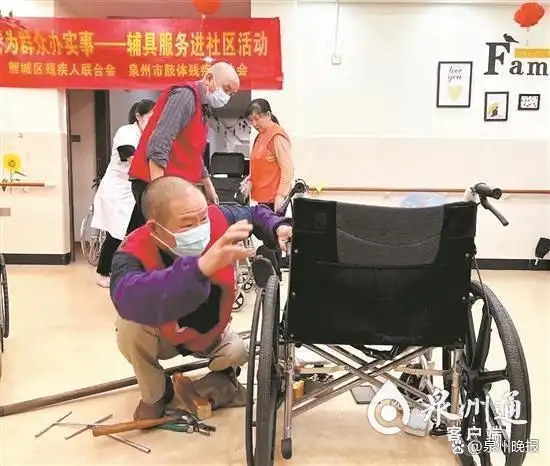- About
- Sustainability
The first provincial-level pilot Caring Station for Community Members with Special Needs in Quanzhou's Licheng District was recently inaugurated in the Hongmei Community, Kaiyuan Subdistrict. The centre is designed to offer essential support services, including daily living assistance, rehabilitation guidance, and inclusive meal programmes for residents with diverse abilities.

Licheng District Federation for Persons with Disabilities provides assistive device repair services
Strategically located next to the community's Party-Building Micro Square, the station integrates various local resources—including the Party-Masses Service Centre, Home-Based Elderly Care Centre, and New Era Civilisation Practice Station. The facility houses a computer area, reading room, cultural and sports space, entertainment lounge, counselling room, and a micro lecture hall. It functions as a comprehensive service hub, delivering policy information, warm meals, wellness support, and cultural engagement activities such as calligraphy, chess, and fitness tailored to the needs of individuals with functional limitations.
"Our community is home to over 100 residents with special needs, primarily those with mobility, hearing, speech, or cognitive challenges," said Yu Wanjin, Party Secretary and Director of the Hongmei Community Residents' Committee. "To strengthen the impact of the Caring Station, we've conducted door-to-door visits to better understand individual needs and provide personalised services. By collaborating with the Yue Shan Elderly Care Centre, we are able to offer everyday assistance, rehabilitation support, and community dining in a compassionate environment."
The station is supported by a dedicated team of 15 volunteers, including members of the Communist Party, who serve on the frontline of daily operations. According to the Licheng District Federation for Persons with Disabilities, these volunteers assist with tasks such as household upkeep and meal delivery, while also engaging in vocational skills training—creating more inclusive employment pathways and entrepreneurial opportunities for those with special needs. These initiatives contribute to enhancing participants' sense of belonging, dignity, and overall quality of life.
Looking forward, Licheng District aims to expand the reach of such Caring Stations to benefit more individuals. "We will leverage the pilot station's success to deliver inclusive, high-quality services," said a representative from the Federation. "By documenting best practices and scaling up initiatives—such as home-based assessments, assistive device maintenance, barrier-free renovations, and employment support—we're working to close service gaps and foster a more accessible, supportive community for all."
Report by Zhang Suping, with contributions from Huang Kaijie (text and photos)
